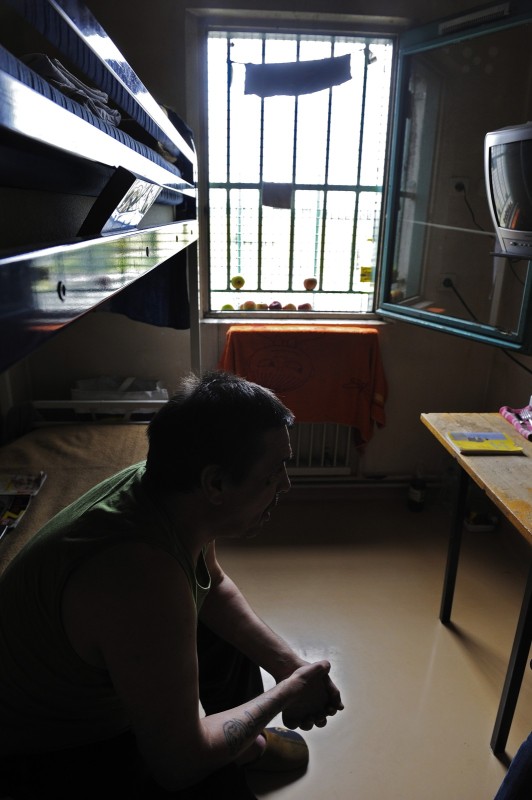
A cell in Longueness Prison
The Council of Europe‘s recently published Annual Penal Statistics officially reveal that European prisons are overcrowded. The report looks at 47 countries of the pan European organization, including the EU countries. The report coordinator, Marcelo Aebi, explained that every country, except Russia, sent data that seemed valid. The numbers may be valid, but the interpretations bear scrutiny. For example, in the calculation of the prisoner-to-space ratio, each country seemed to assess the need for space differently.
Space is never a neutral issue. In penal space, bodies are manipulated, processed and intentionally humiliated. They are confined with no horizon in sight, both figuratively and literally. With bodies piling up in the global prison, the prospect of “rehabilitative” policies and practices becomes ever more distant. Media promotion of insecurity linked with neoliberal austerity measures that trivialize public services have played a major role in passing tough-on-crime legislation, particularly mandatory minimum sentences. This happened in many European Countries, including France under the administration of Nicolas Sarkozy, 2007 to 2012.
The results are clearly visible in France’s prisons today. French prisons are still overcrowded, as are those in half of the European countries. Under the Sarkozy government, judges were encouraged, rewarded, for sending people to jail or prison. Mandatory minimum sentences for recidivist and the obsessive tough-on-crime attitudes pressured judges to sentence for more years. Between 2007 and 2012, 4000 years of incarceration were added every year. According to the president of the conference of prosecutors, while the current executive branch exerts less direct pressure, as long as the mandatory minimum sentences remain in place, little will change.
More importantly the rate of suicides in prison has increased tremendously, with 15.5 for 10,000 prisoners in France and a European high of 29 per 10,000 in Luxembourg. While the conditions before were difficult, today the length of pretrial detention contributes to the escalating suicide rate. This means that much of the overcrowding has nothing to do with “rates of crime”, since many of those being held are awaiting trial. France has a high rate of pretrial detentions compared to other European countries, although still much lower than the United States. The issue of pretrial detention is a key to understanding the rising suicide rate, since most suicide attempts occur at the beginning of detention. When it comes to suicide, the distinction between pretrial and convicted is moot. All that matters is being behind bars.
The Observatoire International des Prisons (OIP) published the story of Martial, who chose to be sent to solitary confinement rather than `share’ a cell with another prisoner. He requested a single cell, which is impossible in Longueness Prison. Longueness was built for a maximum of 196 prisoners. It currently warehouses 380 prisoners. There are no `singles’.
This situation must change!
Christiane Taubira, the current French minister of justice, has pledged to make prison the last resort. As Marcelo Aebi has acknowledged, this is a good but too small step, especially since it doesn’t affect the rest of the European countries and their overpopulated prisons. Instead, Aebi has called for a new approach that reduces the length of sentences and relies much more on alternatives. Aebi argues that the cost of keeping someone in jail (85Euros/day in pretrial detention in France) is high compared to supporting decent housing: “It would cost society less to invest in prevention, from early childhood and adolescence, which would keep us from having almost 2 million Europeans (1, 828 000) in prison.” The global lockdown costs lives, money, well-being, the future. We need to interrogate the relationship between economic crisis, austerity and rates of incarceration.
In all of this, let’s not forget the women, who are overlooked in these statistics, perhaps because 95% of the prisoners are men. None of the articles and reports used for this blog statistically addressed or qualitatively discussed the fate of women prisoners. Where are the women in the French, and the European, lockdown?
(Photo Credit: Michel Le Moine / Divergence)